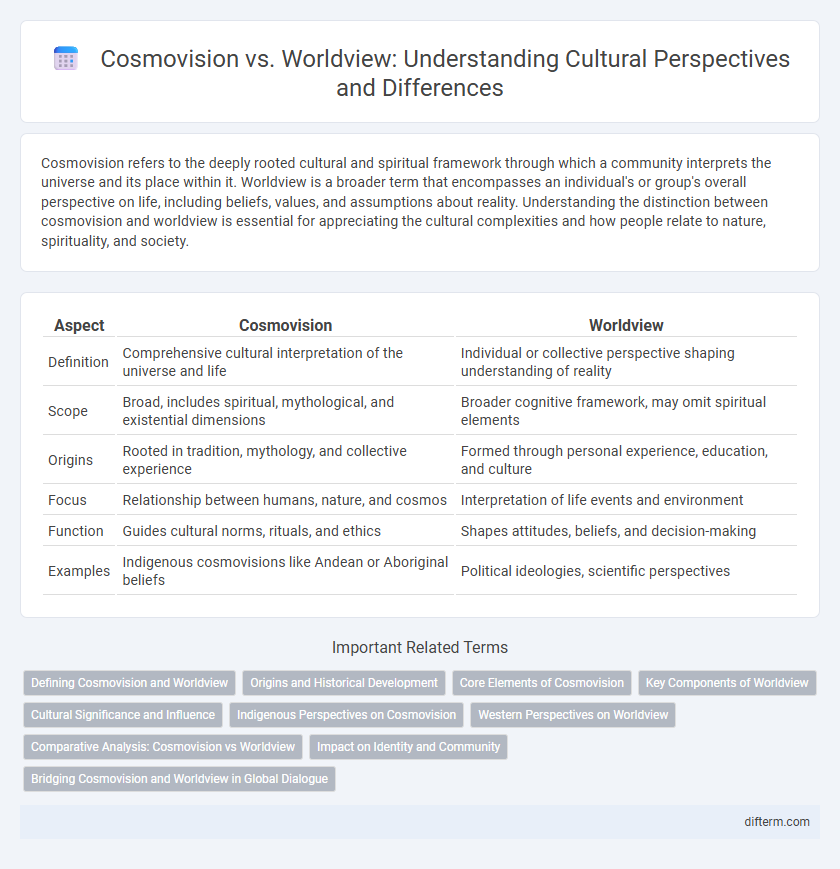Cosmovision refers to the deeply rooted cultural and spiritual framework through which a community interprets the universe and its place within it. Worldview is a broader term that encompasses an individual's or group's overall perspective on life, including beliefs, values, and assumptions about reality. Understanding the distinction between cosmovision and worldview is essential for appreciating the cultural complexities and how people relate to nature, spirituality, and society.
Table of Comparison
| Aspect | Cosmovision | Worldview |
|---|---|---|
| Definition | Comprehensive cultural interpretation of the universe and life | Individual or collective perspective shaping understanding of reality |
| Scope | Broad, includes spiritual, mythological, and existential dimensions | Broader cognitive framework, may omit spiritual elements |
| Origins | Rooted in tradition, mythology, and collective experience | Formed through personal experience, education, and culture |
| Focus | Relationship between humans, nature, and cosmos | Interpretation of life events and environment |
| Function | Guides cultural norms, rituals, and ethics | Shapes attitudes, beliefs, and decision-making |
| Examples | Indigenous cosmovisions like Andean or Aboriginal beliefs | Political ideologies, scientific perspectives |
Defining Cosmovision and Worldview
Cosmovision refers to the comprehensive, culturally rooted understanding of the universe and humanity's place within it, often encompassing spiritual and metaphysical beliefs. Worldview is a broader, more individual perspective shaped by personal experiences, knowledge, and environment, influencing how people interpret reality and make decisions. Both concepts shape cultural identity, but cosmovision integrates collective traditions and existential meaning beyond the empirical scope of worldview.
Origins and Historical Development
Cosmovision originates from indigenous cultures, representing an integrated perception of the universe that combines spiritual, natural, and social elements into a unified whole. Worldview, emerging from philosophical and scientific traditions, reflects a more segmented and analytical approach to understanding reality, developed through historical shifts like the Enlightenment. The historical development of cosmovision emphasizes harmony with nature and ancestral knowledge, while worldview centers on rationality, empirical evidence, and human-centered perspectives.
Core Elements of Cosmovision
Cosmovision encompasses the fundamental beliefs, values, and perceptions through which a culture interprets the universe, emphasizing harmony between humans, nature, and the spiritual realm. Core elements include sacred narratives, rituals, symbols, and a cyclical understanding of time that guide communal behavior and environmental interaction. This framework differs from a worldview by embedding spiritual interconnectedness and collective identity as pivotal to meaning-making processes.
Key Components of Worldview
Worldview encompasses key components such as beliefs about existence, ethics, and human nature that shape individual and collective interpretations of reality. It integrates values, cultural norms, and knowledge systems, influencing decisions and behaviors within a society. Unlike cosmovision, which often reflects spiritual or mythological perspectives, worldview provides a broader cognitive framework grounded in practical and philosophical understandings.
Cultural Significance and Influence
Cosmovision encompasses the collective beliefs and values that shape a community's understanding of the universe, deeply influencing rituals, art, and social norms. Worldview represents an individual's or group's cognitive framework for interpreting reality, often shaped by culture, religion, and experience. Together, cosmovision and worldview profoundly impact cultural identity, guiding moral codes and fostering a sense of belonging within societies.
Indigenous Perspectives on Cosmovision
Indigenous cosmovision embodies a holistic understanding of the universe, integrating spiritual, environmental, and communal dimensions that guide daily life and cultural practices. Unlike the Western concept of worldview, which often emphasizes individualism and rationality, Indigenous cosmovisions prioritize interconnectedness, ancestral knowledge, and harmony with nature. This perspective shapes Indigenous identity, ethical systems, and relationships with the land, serving as a foundation for cultural resilience and sovereignty.
Western Perspectives on Worldview
Western perspectives on worldview emphasize an individualistic, rational approach rooted in Enlightenment ideals, contrasting with cosmovision's holistic integration of spiritual and natural elements. Worldview in the West typically prioritizes empirical evidence and linear time, shaping cultural norms and scientific understanding. These perspectives influence ethical frameworks, societal structures, and global interactions within Western societies.
Comparative Analysis: Cosmovision vs Worldview
Cosmovision encompasses the holistic and culturally embedded understanding of the universe, integrating sacred, spiritual, and environmental dimensions unique to indigenous and traditional societies. Worldview refers to a broader cognitive framework through which individuals or groups interpret reality, often shaped by philosophical, religious, and scientific influences prevalent in globalized contexts. Comparative analysis reveals that while cosmovision emphasizes interconnectedness and ancestral wisdom, worldview highlights rationality and individual interpretation, reflecting distinct epistemological foundations.
Impact on Identity and Community
Cosmovision shapes identity and community by embedding cultural beliefs, values, and rituals that guide collective understanding and social cohesion within a specific cultural or indigenous group. Worldview represents an individual's cognitive framework influenced by personal experiences and external knowledge, affecting how they interpret reality and interact socially. The interplay between cosmovision and worldview profoundly influences cultural preservation, social unity, and the articulation of identity across generations.
Bridging Cosmovision and Worldview in Global Dialogue
Bridging cosmovision and worldview enhances global dialogue by integrating indigenous spiritual insights with contemporary perspectives, fostering mutual understanding and respect. This synthesis promotes cross-cultural communication, enabling diverse societies to address global challenges through shared values and holistic approaches. Emphasizing both cosmic interconnectedness and individual experiences enriches conversations on sustainability, ethics, and cultural identity.
cosmovision vs worldview Infographic

 difterm.com
difterm.com